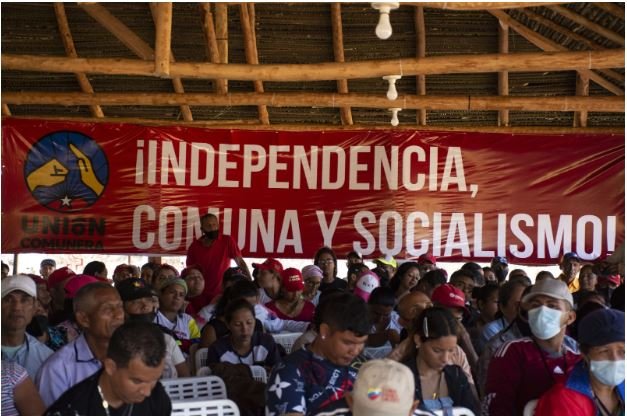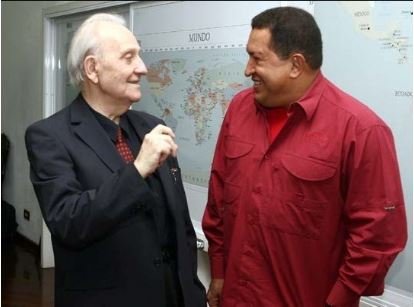Communes Against Capitalism
by Greg Chung
Founding Congress of the Communards Union. Slogan: Independence, Commune, and Socialism! (Source: unioncomunera)
In a future where the world seems more hopeless than today, unemployment, fascism, and forever wars have metastasized beyond what states can manage. In a desperate bid to stay in power, the United States invades Iran, triggering a global famine. However, in M.E. O’Brien’s novel, “Everything for Everyone,” desperate and hungry New Yorkers launch an insurrection at Hunts Point Market, the world’s largest food distribution center. The rebels turn Hunts Point into the New York Commune, which sparks a worldwide revolution that finally takes down capitalism.
While O’Brien’s post-revolutionary communes may be fiction, real communes are struggling to birth a new world today. In December, O’Brien joined a panel hosted by New York’s People’s Forum, alongside Kali Akuno, John Bellamy Foster, and Chris Gilbert to discuss the latter’s “Commune or Nothing,” an account of how Venezuela’s communes are overcoming US sanctions and domestic contradictions by pursuing a radically new economic model. Through intimate interviews with communards and a clear analysis of the commune’s theory, Gilbert asserts that even under the crippling U.S. embargo and the economic crisis, Venezuela continues to be an inspiration for the global working class. In fact, the communes, by giving workers and communities democratic control over production, creates the counter-hegemonic space needed for envisioning and organizing a socialist movement in the 21st century.
The Bolivarian Revolution
According to Gilbert, “21st century socialism” came out of Chavez’s desire to build a form of socialism where the state would promote participatory democratic forms of organization. In the beginning, the government experimented with cooperatives, but too many cooperatives turned out to be capitalist enterprises that wanted a share of government subsidies. In response, Chavez turned to worker management in state-owned enterprises, but those quickly became bureaucratized. After taking inspiration from communal traditions rooted in indigenous history and Maroon resistance, Chavez finally began pushing the commune as Venezuela’s road to socialism.
The Venezuelan government’s main strategy was to establish a legal framework for a communal economy, whose expansion was funded through rents from the booming oil economy. In 2006, the government established communal councils, democratic deliberative committees where neighbors discussed, identified, and addressed the community’s needs by mobilizing resources from the state and from their communities. In 2010, the national assembly passed the “Organic Law of Communes” which allowed communal councils to come together into communal parliaments with the power to establish and manage social property enterprises.
Istvan Mezaros and Hugo Chavez (Source: Monthly Review)
The theory behind communal socialism is heavily influenced by Chavez’s meetings with István Mészáros. Building on Marx, Mészáros’s “Beyond Capital” characterized capital as a “metabolic” system, whose interconnected elements reproduce its logic of competition, permanent accumulation, and the alienation of labor. To explain how the Soviet Union was able to collapse into capitalism so quickly, Mészáros distinguishes between capitalism and the logic of capital. While the Soviet Union had socialized property and was controlled by the state, it had not overcome the logic of capital: state bureaucrats controlled the production process, which was still geared towards the extraction of workers’ surplus. When the Soviet Union collapsed, it was easy enough for state bureaucrats who controlled the means of production to become the capitalists who owned it. Witnessing the collapse made Mészáros realize that managing capital through piecemeal reforms was not enough. Socialism required reproducing an entirely separate logic.
Chavez and Mészáros’s discussions led them to conclude that the commune was the only way to overcome capital’s logic. They defined the commune as a system based on social ownership and social organization of production by the workers, which satisfied the needs and desires of the community. To Mészáros, the communal system, controlled through democratic planning and geared towards the community’s needs, reproduces a metabolism antithetical to capitalism’s profit motive. Inspired by Mészáros, Chavez pushed forward the legal infrastructure to enable and empower communes.
Yet, one year after the commune law was passed, not a single commune was registered. A few success stories would come later, but the super commodity cycle made oil-funded social services more attractive than the difficult task of building communes. The ensuing crises would change that.
Out of Crisis, Opportunity
A triple calamity of plummeting oil prices, economic sabotage by the local elite, and the US embargo have brought the country into its worst crisis since 1989 (when IMF austerity measures sparked the Caracazo uprising). In response, the Maduro government has adopted what some have called “the Chinese model:” building up the country’s productive forces through free trade zones for the private sector and deals with large landowners. According to Gilbert, this growing relationship with the rural bourgeoisie increased tensions between the government and the communes.
Ángel Prado, the spokesperson for El Maizal (Source: Newsclick)
Yet the scale of the crisis also led to a renewed wave of organizing by the communes. El Maizal, Venezuela’s flagship commune, has led the way. Founded in the midst of a land struggle between campesinos and the state-run agricultural corporation, Corporación Venezolana de Alimentos (CVAL), El Maizal has become one of the country’s most militant and economically successful communes. When the economic crisis dried up oil subsidies, El Maizal turned to the masses. The commune offered credit and material support to neighboring farmers, who in turn, re-paid their loans with a portion of their crops. Around the same time, the commune occupied idle land in Lara state, where they took over an abandoned campus and a state-owned pig farm. El Maizal’s aggressive response to the crisis not only recovered lost income, they also proved that communes can grow even when faced with adverse conditions and scarcity.
Encouraged by their success, El Maizal played a major role in rallying Venezuela’s communes into a left-wing pole inside and outside the PSUV. In 2021, El Maizal’s spokesman, Ángel Prado was elected mayor of Simon Planas under a PSUV ticket. Prado had previously defeated the corrupt incumbent during the party primary. The next year, El Maizal hosted the founding congress of the Communards Union, a national league of communes. Around two hundred delegates from fifty communes passed a political program committed to building national, political, and economic infrastructure for the communes, as well as engaging in a constructive and critical relationship with the government.
International Implications
Yet, the communal experience is not just limited to Venezuela. The Bolivarian Revolution also inspired similar communes in the United States. Kali Akuno, co-founder of Cooperation Jackson (located in Jackson, Mississippi), had first come into contact with the communards through the Afro-Venezuelan community. Jackson’s local activists explored the communal councils as a strategy to heighten, rather than manage, capitalism’s contradictions. Combined with black radical thought, they devised the Jackson-Kush plan, which called for contesting capitalism’s hegemony through commune-like institutions: the People’s Assembly and the Fannie Lou Hamer Community Land Trust.
Like communal councils, the Jackson People's Assembly is a direct democratic assembly where community members organize around issues affecting the community and engage in public planning. The Fannie Lou Hamer Community Land Trust (CLT) entrusts a large section of land to social control. Within the CLT, Cooperation Jackson has set up social housing projects, worker cooperatives, freedom farms, and a maker space specializing in digital fabrication. Jackson activists see the Peoples Assembly and CLT as the key pillars for the “solidarity economy,” a post-capitalist society made up of worker cooperatives that service the needs of Jackson’s neglected community.
The assemblies and economic organizations are also a means for the left to contest state power. Having identified the city government as crucial to building a stable market for the solidarity economy, Jackson’s activists hope to use their dual power organizations to contest local elections as they’ve done in the past.
Cooperation Jackson is not a utopian project that detaches itself from existing struggles, but a means of integrating communal practices into other social movements. One of their most recent projects is trying to merge the cooperative and labor movements by convincing labor activists that far from a distraction from class struggle, collective ownership and democratic management can link the fight for wages and benefits to a more ambitious strategy for workers control.
Building Communes Today
The crisis in Venezuela has revived a debate within the left about the relationship between the means and ends. PSUV’s governing faction has emphasized the need to develop the productive forces before social transformation, whereas the communards have used the crisis to reassert to the masses that only the communal road can resolve Venezuela’s socio-economic limitations and contradictions. Cooperation Jackson has brought a similar debate to the US left and progressives by stressing that communal projects are needed to tie existing struggles to a larger strategy of system change.
What unites communards in all countries is the conviction that the revolutionary process must challenge and ultimately overcome the logic of capital by creating new social relations altogether. Utopian projects, Western-style social democracy, and developmentalism can all co-exist with capitalism, but communes can’t. Democratic control of the workplace to meet the needs and desires of the community is antithetical to capitalism’s core principles: maximizing profit and alienation of labor. The transition to socialism will not happen all at once, but the process must begin in the present.



